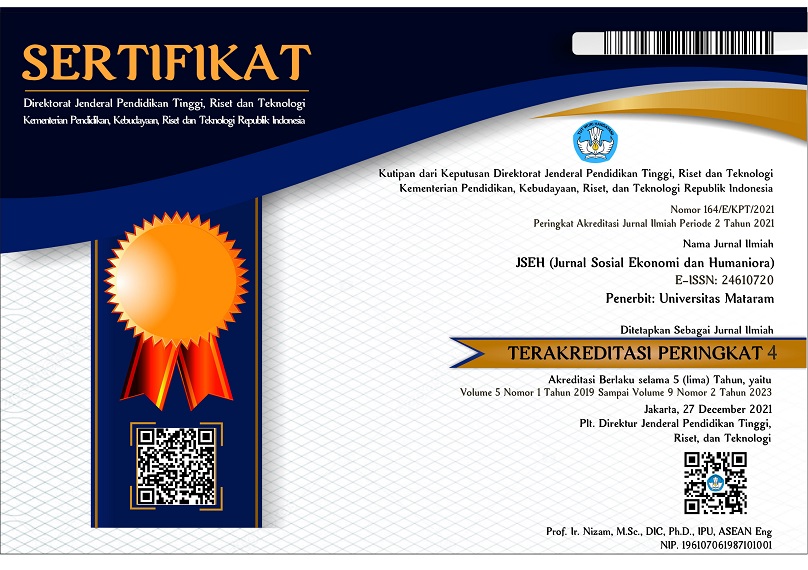Fenomena Overreaction dan Price Reversal di Indonesia
DOI:
https://doi.org/10.29303/jseh.v9i4.419Keywords:
Price Reversal, winner-loser stocks, overreactionAbstract
Tujuan penelitian ini untuk menginvestigasi fenomena overreaction dan price reversal saham serta membuktikan apakah price reversal yang terjadi adalah sebagai akibat overreaction investor di Bursa Efek Indonesia selama periode tahun 2020. Penelitian ini menggunakan data closing price seluruh saham yang terdaftar secara aktif dalam perdagangan serta berturut-turut dalam transaksi harian sejak 10 Januari sampai dengan 20 April 2020. Semua data yang digunakan merupakan data sekunder yang dipublikasikan melalui Bursa Efek Indonesia. Uji hipotesis dalam penelitian ini menggunakan Uji statistik parametrik, yaitu uji beda menggunakan one sample t- test. Hasil pengujian menunjukkan bahwa price reversal yang diindikasikan melalui pertumbuhan harga ektrim IHSG, dimana pertumbuhan tertinggi (winner) dalam 1 hari sebesar 10,19%, terjadi pada hari ke-55 (Tanggal 26 Maret 2020), dan terendah pada hari ke-43 (Tanggal 10 Maret 2020). Pertumbuhan IHSG untuk 2 hari, dimana pertumbuhan IHSG tertinggi untuk 2 hari perdagangan adalah sebesar 1,591% pada hari ke-20 atau Tanggal 6 Februari 2020 dan tererendah sebesar -4,401% pada hari ke-36 atau Tanggal 28 Februari 2020. Penelitian ini tidak menemukan bukti adanya overreaction investor terhadap informasi baru diseputar periode reversal baik pada saat pertumbuhan tertinggi (winner) maupun pertumbuhan terendah (loser) pada saham-saham yang terdaftar di BEI dalam jangka waktu Januari sampai April 2020. Hal ini menunjukkan bahwa peningkatan/ penurunan harga yang ekstrim bukan disebabkan karena investor bereaksi berlebihan terhadap informasi baru baik itu dalam merespon good news maupun bad news.
This research aims to investigate the phenomenon of investor overreaction and stock price reversal and prove whether the observed price reversal is a result of investor overreaction on the Indonesia Stock Exchange during the year 2020. The study utilizes closing price data for all actively traded stocks in consecutive daily transactions from January 10 to April 20, 2020. All data used are secondary data published through the Indonesia Stock Exchange. Hypothesis testing in this research employs parametric statistical tests, specifically a one-sample t-test for mean differences. The test results indicate that the price reversal, indicated through extreme IHSG (Indonesia Stock Exchange Composite Index) price growth, does not provide evidence of investor overreaction to new information. The highest growth (winner) in a single day is 10.19%, occurring on the 55th day (March 26, 2020), and the lowest growth occurs on the 43rd day (March 10, 2020). Two-day IHSG growth shows the highest growth of 1.591% on the 20th day (February 6, 2020), and the lowest growth of -4.401% on the 36th day (February 28, 2020). This research does not find evidence of investor overreaction to new information during both the highest growth (winner) and the lowest growth (loser) periods in stocks listed on the Indonesia Stock Exchange from January to April 2020. This suggests that extreme price increases or decreases are not caused by investor overreactions to new information, whether it be good or bad news
References
Apriyono, A., Taman, A., Ekonomi, F., Negeri, U., & Indonesia, B. E. (2013).
Atkins, A. B., & Dyl, E. A. (1990). (1990). Price reversals, bid-ask spreads, and market efficiency. Journal of Financial and Quantitative Analysis, 25(4), 535-547.
Bondt, W. F. M. De, & Thaler, R. (1985). Does the Stock Market Overreact ? XL(3).
Chan, W. S. (2001). Price Drift and Reversal After News.
Cox, D. R., & Peterson, D. R. (1994). Stock Returns following Large One‐Day Declines: Evidence on Short‐Term Reversals and Longer‐Term Performance. The Journal of Finance, 49(1), 255–267. https://doi.org/10.1111/j.1540-6261.1994.tb04428.x
Da, Z., Liu, Q., & Schaumburg, E. (2014). A closer look at the short-term return reversal. Management Science, 60(3), 658–674. https://doi.org/10.1287/mnsc.2013.1766
Fabozzi, F. J., & Drake, P. P. 2009. (2009). Finance: capital markets, financial management, and investment management. John Wiley & Sons.
Hameed, A., & Mian, G. M. (2015). Industries and stock return reversals. Journal of Financial and Quantitative Analysis, 50(1–2), 89–117. https://doi.org/10.1017/S0022109014000404
Jogiyanto, H. M. (2010). Teori Portofolio dan Analisis Investasi (Ketujuh). BPFE. Yogyakarta.
Kaul, G., & Nimalendran, M. (1990). Price reversals. Bid-ask errors or market overreaction? Journal of Financial Economics, 28(1–2), 67–93. https://doi.org/10.1016/0304-405X(90)90048-5
Rahmawati & Suryani, T. (2005). Over Reaksi Pasar terhadap Harga Saham Perusahaan Manufaktur di Bursa Efek Jakarta. Simposium Akuntansi Nasional VII Solo, September: 15-16.
Riyanto, A., & Arifin, Z. (2014). ANALISIS OVERREACTION, FIRM SIZE DAN LIKUIDITAS SAHAM PADA SAHAM SYARIAH DAN NONSYARIAH DI BURSA EFEK INDONESIA. 1990, 1–15.
Zarowin, P. (1990). Size, Seasonality, and Stock Market Overreaction. The Journal of Financial and Quantitative Analysis, 25(1), 113. https://doi.org/10.2307/2330891
Downloads
Published
How to Cite
Issue
Section
License
Copyright (c) 2023 Iwan Kusmayadi, Djoko Suprayetno, Laila Wardani, Muhammad Ahyar

This work is licensed under a Creative Commons Attribution-NonCommercial 4.0 International License.








